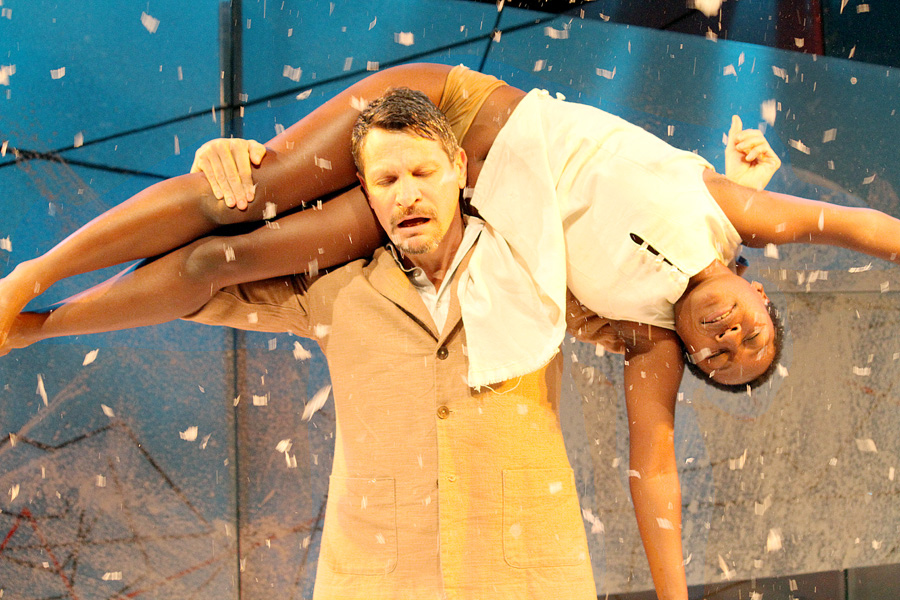“Empire does not require love, only loyalty.”
With this, the stage is set. Waiting for the Barbarians is decidedly anti-love, presenting instead a steel-cold latticework of power relations and authoritarian abuse. For Empire imprisons all semblance of humanity, then throws away the key. Treading a thin line between provoking masochism and empty misanthropy, the Segal Centre’s latest is an unrelenting look at the violence of colonialism as it echoes throughout the ages.

A co-production with Mopo Cultural Trust, and adapted from the novel by South African Nobel Laureate J. M. Coetzee, Waiting for the Barbarians centres on the spectacular fall from grace of an unnamed Magistrate, who begins to question the Empire that he serves. This personal awakening parallels the Empire’s increasingly paranoid war efforts, led by the sadistically efficient Colonel Joll. The storyline bears a thematic fraternity with Nineteen Eighty-Four, George Orwell’s masterful critique of authoritarianism. Both treat sex as less an act of love and more a vehicle for political agency, and in both, the protagonist’s swan song is wrenching, painful—a testament to the anguish and despair that countless millions have felt at the hands of an empire’s inhumanity.
As Colonel Joll, Nicholas Pauling delivers his lines with nuanced tones, a combination of enunciated venom and smooth seduction that invokes a bone-shattering chill. Joll speaks of torturing prisoners as one would speak about biting into a juicy piece of tenderloin—Pauling’s portrayal leaves the impression that, for Joll, the two are not dissimilar. The sunglasses he wears are a simple but effective touch; whether this is an element in the script or a result of Craig Leo’s intelligent costume design is unclear, but the resulting juxtaposition between Joll’s jovial airs and the terrifying evil lurking behind the lenses is immensely powerful.
Grant Swanby’s Magistrate is enduring and sympathetic, tackling an often-wordy script with amiable effort. Chuma Sopotela, whose character is simply named ‘Girl,’ radiates strength, grace, and courage. A significant virtue of the story is its refusal to allow the Girl to be objectified by various tropes of ‘barbarian’ nations, and Sopotela brings dignity to the role.

Of the many laudable aspects of this production, the most praiseworthy is its resistance to historicization. All too often colonialism is dismissed as a particularly hideous artifact of the past. In keeping the Empire nameless, Coetzee reminds audiences to be aware of the ways in which past imperialist violence continues to affect the present world, as well as the ways in which syndromes of racism have evolved to remain active in contemporary society. This focus on relevancy is evident in all aspects of the production, but particularly its technical elements. Leo’s costume design suits the roles while remaining beyond national identification, while his set—a stylish tessellation of glass and wood—serves extremely well at resisting historicism with its post-modern aesthetic.
At the same time, the production avoids heavy-handed political commentary. Philip Glass, who adapted an opera from the novel, pointed out how the Iraq War bears striking similarities to the events in the story. There are also fertile sources to draw upon in political theory, which has seen renewed interest in the concept of ‘Empire’ in the past decade. Indeed, it would have been all too easy for director Alexandre Marine, who also adapted the novel, to make explicit parallels between this production and American conquests, expansion of global capitalism, or any other number of contemporary events. That he does not is perhaps the correct choice; the audience has enough to endure with the suffocating levels of violence on stage. However, one hopes that viewers will be able to connect the pain portrayed with pain in the present world, without overt indicators that this is so.
Despite these successes, certain elements of the production warrant amelioration. While understanding that the story winds to a fever pitch in the second act, this critic maintains that the ratio of shouting to speaking in certain moments is decidedly less than optimal. The Magistrate’s narration is written in chilling, penetrating, but also florid prose—one better suited to the armchair reflections of a student of philosophy than a man clutching at the shattered remnants of his worldview. It takes finesse to steer a bleak tale away from the black hole of nihilism.
Still, Waiting for the Barbarians weaves a nightmarish web of hierarchy and violence. The voyeuristic position of the audience vis-à-vis the Magistrate makes it next to impossible to leave the performance without reflecting on the pedestal of pain upon which Western civilization is founded. ‘Anyone can be a barbarian’ and ‘everyone is a barbarian’ are two different claims, and the production doesn’t quite succeed in making this distinction. But one supposes that getting people to reflect on such concepts at all is a triumph in itself.
Waiting for the Barbarians is running until Feb. 17 at the Segal Centre for Performing Arts (5170 Cote-Ste-Catherine). Student tickets $24.









